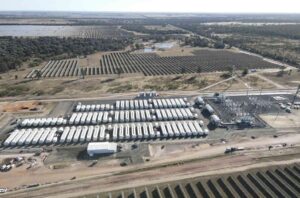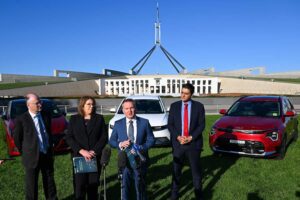Former coal baron Trevor St Baker is creating a new $200 million fund that is focused on electric mobility and zero carbon energy options as he seeks to replicate the success of his first energy innovation fund.
The first St Baker Innovation Fund started off in 2015 and parlayed around $300 million of family money into a billion dollar success story, thanks to the achievements, and public listings, of EV fast charger maker Tritium, battery materials group Novonix, and the sale of energy retailer ERM Power.
A new fund, the St Baker Innovation Fund 2, is seeking contributions from outside investors, including super funds and high net worth individuals, to create a new $200 million vehicle that will support follow-on fund raisings from some of the companies in the original portfolios, and new investments.
St Baker is probably best known for his ownership of the Vales Point coal generator in NSW, from which he reaped massive profits after buying it from the state government at a peppercorn price, and his outspoken support of the Coalition government’s go-slow on the transition to renewables.
But while he was voicing skepticism about the pace of the energy transition, St Baker and his family spotted opportunities in some of the most exciting new technologies, particularly in the area of electric mobility. He has now sold his interest in Delta Energy, the owner of Vales Point, at a massive profit.
The portfolio of the first fund also includes electric bus manufacturer Nexport, ride share company Revel, autonomous transport company Applied EV, fast charging network operator Evie Networks, vertical take off (VTOL) company AMSL Aero, and micro-mobility provider PureEV.
The new fund has already made follow-on investments in three of those companies – Evie Networks, Applied EV, and AMSL – and CEO Rodger Whitby says the new fund will focus on more mature investments, although it will still invest in some interesting start-ups.
“We’ve had a lot of interest from other parties wanting to invest alongside what we do,” Whitby said on Wednesday. “And so we’ve decided that we’re going to put more of a formal structure around that. So we’re launching a second Fund, which will be much more traditional.”
Whitby says the two main areas of focus will be in the electricity space – such as behind the meter technologies, micro-grids, LEDs, and battery storage – and electric mobility, which he said could deliver immediate emissions reductions at low cost.
“When you take an internal combustion vehicle off the road and replace it with an electric vehicle powered by renewable energy you’re going to save cost on the fuel, you’re going to save cost on the annual maintenance,” Whitby said.
“And we’re rapidly approaching price parity, where those vehicles will cost the same as internal combustion engine vehicles, so transport is a big emission sector that we’re able to transform to zero emissions, and actually save money.”
Whitby said the new fund will also be open to both super funds and high net worth individuals, although he conceded that – given the failings of the banks in California and Credit Suisse – it was probably not the best time to raise funds.
But he said such funds were important in Australia, to encourage local innovation and perhaps discover the next “unicorn”.
“We just think that the super funds ought to be participating more in the earliest stage investment, not big exposures, but enough to make sure that they’re actually building their own pipeline of future investment opportunities,” Whitby says,
“So I think, you know, we would be the ideal vehicle to help them do that. And it’s not just the investment opportunities. But it’s jobs and it’s the jobs of the children of their members. So why wouldn’t they be interested in it?”
Whitby says the offer will be open until the end of the year.







